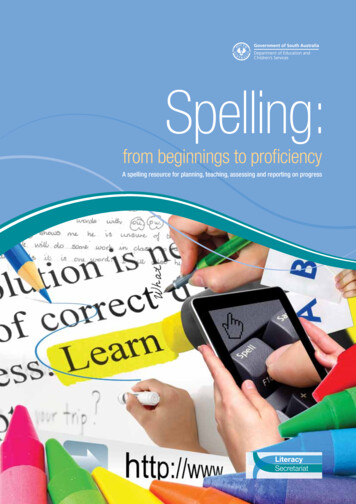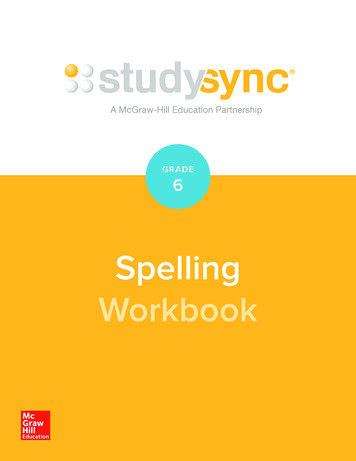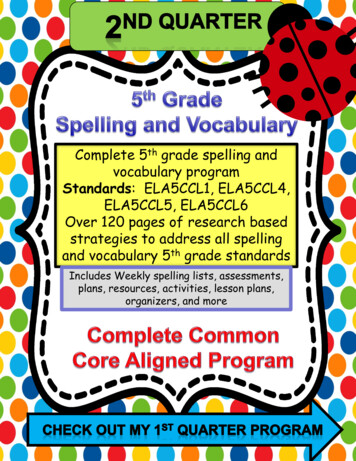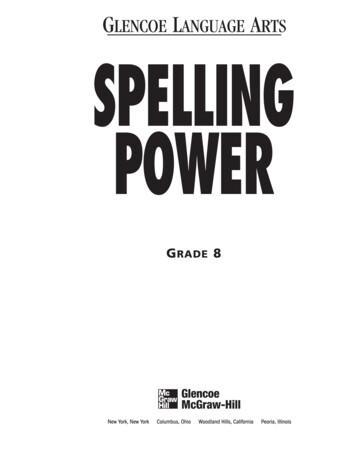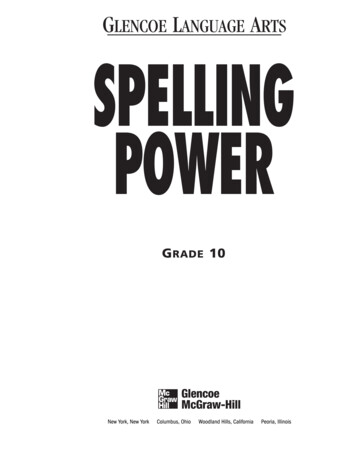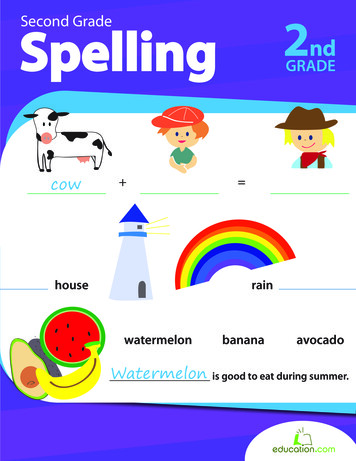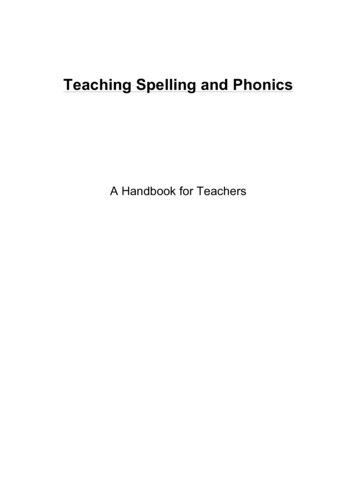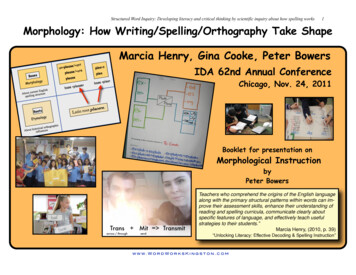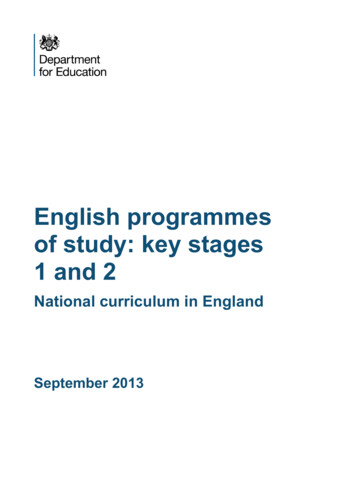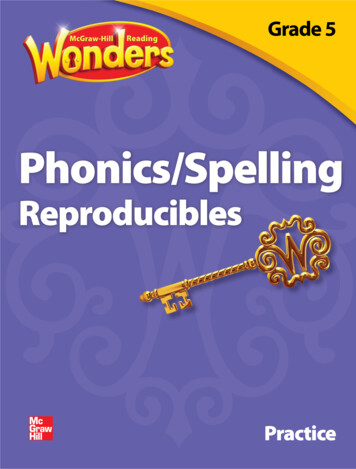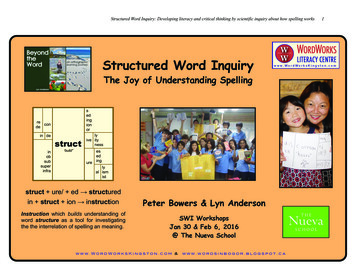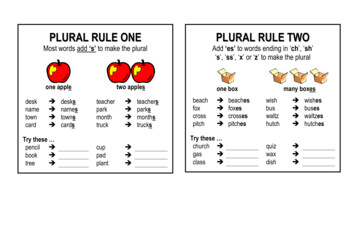
Transcription
PLURAL RULE ONEPLURAL RULE TWOMost words add ‘s’ to make the pluralAdd ‘es’ to words ending in ‘ch’, ‘sh’‘s’, ‘ss’, ‘x’ or ‘z’ to make the pluralone appledesknametowncard Try these pencil book treedesksnamestownscardstwo applesteacherparkmonthtruckcuppadplant teachersparksmonthstrucksone boxbeachfoxcrosspitch Try these church gas classbeachesfoxescrossespitchesmany boxeswishbuswaltzhutch quizwaxdish wishesbuseswaltzeshutches
PLURAL RULE THREEPLURAL RULE FOURWhen the letter before a ‘y’ is a consonant,change the ‘y’ to an ‘i’ before adding an ‘es’When words end in ‘ay’, ‘ey’, ‘iy’, ‘oy’and ‘uy’ add an ‘s’ to make the pluralone babycityponyfilly cities ponies filliesTry these family daisy armynappy two babiesberryreplybelly berries replies belliesladyjellypartycherry one donkeyboypulleyrelay boys pulleys relaysTry these day monkey tray trolleytwo donkeysplaygreyalley plays greys alleyssatayvalleydelaykey
PLURAL RULE FIVEPLURAL RULE SIXWhen words end in ‘f’ or ‘fe’ changethe ‘f’ or ‘fe’ to a ‘v’ before adding ‘es’When a word ends in ‘o’ and comes aftera consonant, add ‘es’ to make the pluralone knifetwo knivesone dingoleafwifethief leaves wives thieveswolfelflife wolves elves livesTry these halfhoof loafshelf selfcalfExceptions – cliffs, chiefs, roofs, dwarfs & handkerchiefscargopotatoavocado cargoesmango potatoeshero avocadoes buffalotwo dingoes mangoes heroes buffaloesTry these volcanotomato dominoechomosquito torpedo Exceptions – pianos, solos, banjos, Eskimos and radios
PLURAL RULE SEVENPLURAL RULE EIGHTSometimes, a word may completelychange its form when a plural is madeSometimes, a word may stay the samein both its singular and plural formone childpersongoosefungus people geese fungiTry these foot mouse toothone fishtwo childrencriterionnucleusmanwomancactusdice criteria nuclei men breamaircraftsalmon bream aircraft salmonTry these species deer offspringtwo fishseriestroutmoosesheepperchtuna series trout moose
PLURAL RULE NINEPLURAL RULE TENIt maybe confusing making compound words into pluralforms. In all cases the first word is made plural.Many words, particularly from other languageshave exceptions when making them pluralone analysis of data – two analyses of dataMaxine is terrified of men of war jelly fish.brother in lawcourt martialattorney generalTry these son in lawheir apparentpasser by brothers in lawcourts martialattorneys generalOther examples are curriculumcriterionantennabureau corpus appendicesindicesfocicorpora *Try these octopusbasis formulagateau datumcrisis* quite tricky and uncommon
SPELLING RULE ONESPELLING RULE TWOWhen a word ends with a short vowel followed by aconsonant, double the last consonant before adding ‘ed’When action words end with an ‘sh’, ‘ch’, ‘ss’, ‘x’, ora ‘z’ and ‘es’ is added to make the present tense.The girls skip.The girls skipped.Fiona waltzes most Tuesday nights with Jim.dropadmitoccur dropped admitted occurredTry these trip mop submittrimshopfliptrotrubprefer trimmed shopped flipped crosswaxfish crosses waxes fishesTry these buzz watch pushcatchrelaxreachtaxpassfix catches relaxes reaches
SPELLING RULE THREESPELLING RULE FOURWhen an action word ends with a consonant followed by a ‘y’,change the ‘y’ to an ‘i’ before adding ‘es’Double the consonant before adding ‘ing’ to words that have ashort vowel followed by a consonant at the endGrandad was sitting in his chair all morning.The pirate buries his treasure with great care.emptytrycarry empties tries carriesTry these hurry fly worrytidycopyfrydrydirtyapply tidies copies fries stopwrapstep stopping wrapping steppingTry these trap rip chopslamnodskip slamming nodding skippingbegmaprub
SPELLING RULE FIVESPELLING RULE SIXWhen a word ends in a silent ‘e’, drop the ‘e’ beforeadding an ‘ing’ The magic ‘e’ runs away !When a word ends in double consonant, do not doublethe last letter before adding an ‘ing’Ian loves platform diving on his weekends.Kellie has been thinking about marrying Ridge.movetasterace moving tasking racingTry these lovechange hopehidechasewipe hiding chasing wiping store drive stareException – be beingreportbumpwash reporting bumping washingcopyworkdust copying working dustingTry these carryhurry spybend campscratch For words ending in ‘y’ leave the ‘y’ and add ‘ing’
SPELLING RULE SEVENSPELLING RULE EIGHTFor action words that end in ‘ie’, changethe ‘ie’ to a ‘y’ before adding an ‘ing’Often ‘ly’ is added to base words to turn theminto adverbs, adjectives or describing wordsRynell bungy jumped carefully from the tower.Bryan enjoys lying on his back to watch clouds.Try these tieliedie loveslowmain lovely slowly mainlyTry these rude quick softsmartpurenicekindloudglad smartly purely nicely
SPELLING RULE NINESPELLING RULE TENWhen adding ‘ly’ to words which end in ‘y’, change the‘y’ to an ‘i’ before adding the ‘ly’When the suffix ‘full’ is added to the end of a base word,one of the ‘ls’ has to be droppedJanelle paints colourful works of art.Kirsty scored the goal quite daintily.happymerryeasy happily merrily easilyTry these hungry weary heavybusyprettycosynecessarydayangry busily prettily cosily hopecheerthank hopeful cheerful thankfulTry these truth play feartasteuseforce tasteful useful forcefulpeacedreadjoy eg; ‘thankful’ means full of thanks
SPELLING RULE ELEVENSPELLING RULE TWELVEBefore adding ‘er’ and ‘est’ to words ending in a consonant,followed by a ‘y’, change the ‘y’ to an ‘i’Double the last letter before adding ‘er’ or ‘est’ to words that havea short vowel followed a single consonantDean is the skinniest member at the local gym.lazylovelymighty lazier loveliest mightierTry these sandy happy curlysaltyfunnyheavy saltiest funnier heaviestcrazyfancydry These new words are called degrees of comparisonLyne has become a great ocean swimmer.fitslimrob fittest slimmest robberTry these spin sit drumtravelwinslip traveller winner slipperrunbeginstop
SPELLING RULE THIRTEENSPELLING RULE FOURTEENDouble the last letter of words ending in a short vowel followed bya single consonant before adding a ‘y’Just add a ‘y’ to words ending in twoconsonants to form describing wordsRicky enjoys lying back on a sunny day.The last few days have been quite windy in Moura.ragshagcat raggy shaggy cattyTry these run wool furwitfogfunmudskinbad witty foggy funny dirtmightthirst dirty mighty thirstyTry these rock wealth chilltrickhealthsand tricky healthy sandyfilthsmartfuss
boneiceroseSPELLING RULE FIFTEENSPELLING RULE SIXTEENFor words ending in a silent ‘e’, youmust first drop the ‘e’ before adding a ‘y’To indicate possession or ownership by a person orobject, an apostrophe (‘) followed by an ‘s’ is addedKookaburras are very noisy birds.Billy’s horse bucked him at the rodeo. bony icy rosyTry these flake taste spikesmokestoneracescarenoselaze smoky stony racy horseJennyoffice horse’s Jenny’s office’sTry these Santa Moura PeterBillybirdNigel Billy’s Bird’s Nigel’scarMaryshoe
SPELLING RULE SEVENTEENSPELLING RULE EIGHTEENTo indicate ownership by a person whose name ends in an‘s’ or a plural noun, just add an apostrophe (‘)An apostrophe (‘) is also used to create a contraction, indicatingwhere a letter or letters have been left outCamilla rubbed the sunscreen on Charles’ chest.She’s really looking forward to the ballet recital.poetsgasesLewis poets’ gases’ Lewis’Try these flowers Dennis classGladysbabiesRoss Gladys’ babies’ Ross’Chrisbottlesboss I amshe wouldwho is I’m she’d who’sTry these you are it is can notthey haddo notlet us they’d don’t let’swhere ishe isshe will
SPELLING RULE NINETEENSPELLING RULE TWENTY‘i’ before ‘e’ except after ‘c’CAPITAL LETTERS are used at thebeginning of names and placesMany people believe unicorns exist.rel vedec tw rd relieve deceit wierdTry these rec ven ghbour anc ntc lingv nglac r ceiling vein glacierth rfr ndrec pt Remember there are ALWAYS exceptions !Uluru is a well known Australian landmark.brisbanelukemoura Brisbane Luke MouraTry these adelaide donald mackayrebeccayeppoonmikarla Rebecca Yeppoon Mikarlaphillipgladstonealex
SPELLING RULE TWENTY ONESPELLING RULE TWENTY TWOPrefixes can be added to base words to create new words.Prefixes ending in vowels are added directly to base words.Sometimes negative prefixes are added to wordsto create new words and change their meaningIt is important to try to recycle any items we can.Some people say it’s impossible for cows to talk.re movede frostpara chute remove defrost parachuteTry these tri anglekilo metre auto graph tele visionre gaingiga bytede voidre alignmulti age television regain gigabyte un welldis missin ferior unwell dismiss inferiormis spellim patientmal treat misspell impatient maltreatCreate new words using these prefixes non anti sub dys ab mis
SPELLING RULE TWENTY THREESPELLING RULE TWENTY FOURPrefixes can be added to roots to form new words.Roots often have meanings from other languages.When adding a vowel suffix to words endingin a silent ‘e’, drop the ‘e’ and add the suffix.Mr Smith may predict * a hot summer again.Vikings lived many, many years ago.di videaudi blepro ceed divide audible proceedinter ceptde tatchauto matic intercept detatch automaticTry these chron icex ceed cred ible per mitmeta phor poly gon * ‘pre’ means ‘before’ and ‘dict’ means ‘speak’store ageforgive enpale est storage forgiven palest livedlive edmanage er manageramaze ing amazingTry these nice estlike en grave ity use ing arrive alforge ery Remember there are always exceptions to the rule !
SPELLING RULE TWENTY FIVESPELLING RULE TWENTY SIXThe letter ‘g’ may have a soft or hard sound.A soft ‘g’ is usually followed by an ‘i’ or ‘e’.A hard ‘g’ is usually followed by a consonant or an ‘a’, ‘o’ or ‘u’The letter ‘c’ may have a soft or hard sound.When ‘c’ meets an ‘a’, ‘o’ or ‘u’ its sound is hard.When ‘c’ meets an ‘e’, ‘i’ or ‘y’ its sound is soft.‘g’ in ‘golf’ is hardcards (hard c)gypsygoatgoose soft hard hard‘g’ in ‘gem’ is softgeneralgelgobletWhich are hard and which are soft ? gymgutter gingergiant gasgather soft soft hard candlecymbalscave hard c soft c hard ccentipede (soft c)cuddlecircuscurlyIdentify which are hard and soft ? caringcycle citizencat comedycircle hard c soft c hard c
SPELLING RULE TWENTY SEVENSPELLING RULE TWENTY EIGHTCAPITAL letters are used to spell the namesof proper nouns, including people and placesHomophones are words that have the samesound but a different meaning and spelling.Lloyd is an accomplished bowler in Moura.adelaidelukelion’s park Adelaide Luke Lion’s ParkTry these biloelachristmas roverqantasmazdaenglishjessicajulyaustralia Qantas Mazda English A pair of scissors.routeallowedpause root aloud pawsThe pear is a sweet fruit.principalmaiddays principle made dazeWrite another word that sounds the same as practisemain malethrew fournot
SPELLING RULE TWENTY NINESPELLING RULE THIRTYA homographs is a word that may havemore than one meaning or pronunciation.Sometimes when writing, words may be shortened.These are known as abbreviations.A calculator is a useful object.The Lawyer said, “I object !”Other examples The front of a ship; to bend or a knotbow A breeze or to turn aroundwind To leave people or a dry, arid placedesertCan you identify the different meanings ? close excuse woundI need to make an appointment to see Dr Phillips.Other examples kmkilometre cmcentimetre AustAustraliaTry these kilogramexampleapproximately StreetAnonymousante meridian St anon a.m.pageQueenslandsecond
SPELLING RULE TWO When action words end with an 'sh', 'ch', 'ss', 'x', or a 'z' and 'es' is added to make the present tense. Fiona waltz es most Tuesday nights with Jim. cross cross es catch catch es wax wax es relax relax es fish fish es reach reach es Try these buzz tax
